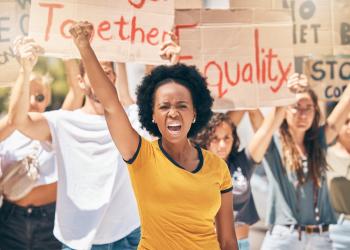The Heckler’s Veto and the First Amendment
By Robert Phillips
Deputy District Attorney (ret.)
Some years back I authored a memo entitled “Constitutionally Protected Expressive Activity & the First Amendment: Who Ya Gonna Call?” Over the years, I’ve expanded this memo to cover a whole pile of First Amendment, freedom of expression issues. This is available to paid Professional subscribers online in the LegalUpdates.com library.
However, the primary objective of this memo has remained the same: To warn police officers that when dealing with canvassers or others who plant themselves in front of a privately owned store such as a supermarket, home supply warehouse or other similar establishment for the purpose of collecting signatures, distributing pamphlets, soliciting funds for a charity, panhandling, or any other politically, socially, or religiously motivated purpose, it is best to just leave that person alone and let the business shoulder the burden of going to court and asking for a court order prohibiting or limiting that person’s activities.
That’s because the person who may be upsetting the store owner typically has a First Amendment right to do what he is doing.
To prevent or attempt to control that activity requires a court, at an evidentiary hearing, to first balance the “time, place and manner” of such an activity with the store owner’s desire to prevent it from occurring on their property, while taking into consideration the canvasser’s First Amendment freedom of expression rights. The cop in the field is simply not equipped to make such a determination.
Well, it seems that the city of Seattle never got the memo, so to speak, or at least didn’t realize that the same issue is involved when the activity is occurring in a public park. In a slight variation from the above situations, the recently published Ninth Circuit Court of Appeals case of Meinecke v. City of Seattle (9th Cir. April 18, 2024) F.4th [2024 U.S. App. LEXIS 9390] expands the rule a little for us.
In Meinecke, it seems that the appellant, Matthew Meinecke, decided in June of 2022 that he was going to attend an abortion rally, and then a couple days later, an LGBTQ pride event. Both events were held in a public park called the Seattle Center. Meinecke’s purpose in attending these events was to preach the word of God, and perhaps convince the attendees of the (alleged) error of their ways. Not surprisingly, the attendees at these two events did not take kindly to anyone potentially by preaching how God might view the issues being discussed.
Several attendees at each event decided to silence Meinecke by physically assaulting him. The Seattle police, up until the assaults, wisely stayed out of it. But when the respective confrontations resulted in violence, they took action. When they did act, however, they didn’t arrest the ones doing the assaulting. They removed the person whose presence was causing the problem, Matthew Meinecke.
Meinecke was arrested at both events for something simply called “obstruction,” under Seattle’s Municipal Code Ordinance § 12A.16.010(A)(3). This is similar to California’s P.C. § 148(a)(1), interfering with a peace officer in the performance of his or her duties. Meinecke was booked in the second instance. And while charges were never filed, he was told after his second arrest that the city might charge him in the future if he didn’t behave.
So Meinecke sued the city in federal court pursuant to 42 U.S.C. § 1983), seeking to enjoin the enforcement of § 12A.16.101 under the circumstances of this case. The federal district (trial) court denied Meinecke the relief he sought. However, the Ninth Circuit Court of Appeal disagreed. In its ruling, the Ninth Circuit, after a long discussion, held that the restrictions on Meinecke’s speech constituted what the court referred to as a “content-based heckler’s veto,” and a violation of the First Amendment, in that the city failed to carry its corresponding burden to justify the restrictions they were applying by arresting him and forbidding him from exercising his constitutional rights.
As noted by the court, the precedent is clear: “The prototypical heckler’s veto case is one in which the government silences particular speech or a particular speaker ‘due to an anticipated disorderly or violent reaction of the audience.’” (Italics in original; citing Santa Monica Nativity Scenes Comm. (9th Cir 2015) 784 F.3rd 1286, at 1293.) In discussing the problems inherent in allowing the beliefs or feelings of someone to “veto” the free expression of another, the court noted that “the Supreme Court has emphasized as ‘firmly settled’ that ‘the public expression of ideas may not be prohibited merely because the ideas are themselves offensive to some of their hearers, or simply because bystanders object to peaceful and orderly demonstrations.’” (Citing Bachellar v. Maryland (1970) 397 U.S. 564, 567.)
In this case, it was clear that the Seattle police officers interfered with Meinecke’s free speech rights simply because of the violent reaction of others. This violated the rule that Meinecke’s First Amendment rights take precedence over the objections of those attending the abortion rights and LGBTQ pride rallies.
What all this means for the law enforcement officer on the beat is that when he or she encounters different persons or groups expressing opposing views, the officer is there for the sole purpose of preserving the peace, without taking sides, as difficult as that may be. If, and only if, one side resorts to violence, is that officer legally justified in stepping between to the two and making arrests. And then, the arrests are to be of those who are perpetrating the violence; not those who are simply exercising their freedom of speech. Acknowledging the fact that it may just seem simpler to remove the one who is the source of the agitation, as Meinecke was in this case, the Constitution does not allow an officer the option to take the easy way out. That’s why the officer gets paid the big bucks.

